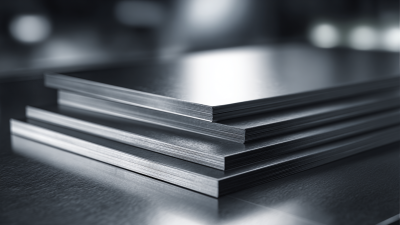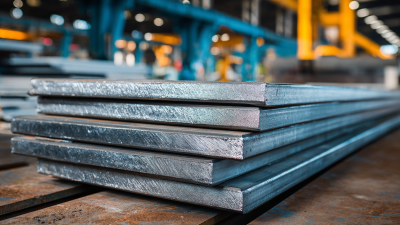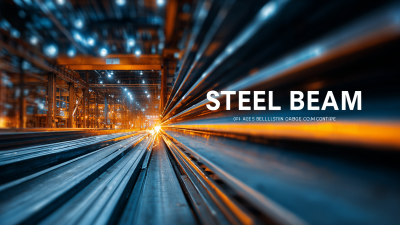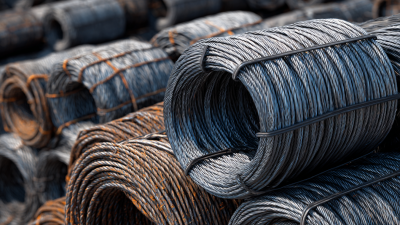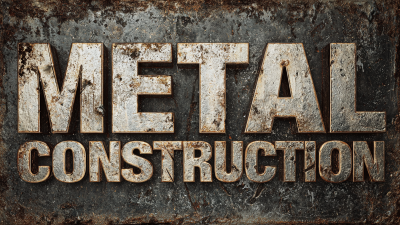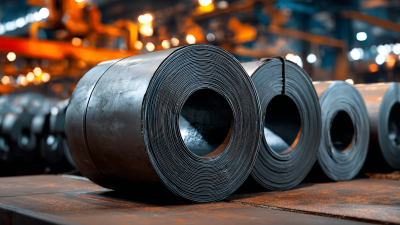
As industries continue to evolve, the innovations surrounding Metal Steel Sheet technology are becoming increasingly crucial. According to a report by Research and Markets, the global steel market is projected to reach over $2 trillion by 2027, driven by advancements in manufacturing processes and material science. With the rising demand for lightweight, durable, and corrosion-resistant materials, Metal Steel Sheets are at the forefront of this transformation, enabling manufacturers to boost efficiency and sustainability.

In the automotive sector, for instance, the implementation of high-strength Metal Steel Sheets has been reported to enhance vehicle performance while reducing weight, thus contributing to improved fuel economy. As we look to the future, the development of innovative coatings and production techniques promises to further revolutionize the Metal Steel Sheet industry, meeting the ever-changing needs of various sectors and setting the stage for a new era of industrial application.
The sheet metal fabrication industry is on the brink of a revolution, thanks to emerging technologies that are transforming metal steel sheet production. Innovations such as digital transformation under the banner of Metals 4.0 are reshaping how companies operate, allowing for greater efficiency and enhanced quality control. This shift is essential as industries move towards more sophisticated manufacturing processes, catering to the increasing demand for customized metal components that meet stricter material standards.
As the electric vehicle market continues to expand, the demand for specific metals like aluminum and nickel rises, further pushing manufacturers to utilize advanced material sciences. Notably, breakthroughs like the development of a single-atom-thick metal layer by Chinese researchers could unlock new avenues in manufacturing, enabling the production of ultra-lightweight and durable materials ideal for various applications.
**Tips for manufacturers:** First, consider integrating digital tools into your production lines to streamline processes and improve product quality. Second, stay abreast of material innovations, such as those seen in additive manufacturing, to enhance your offerings and maintain competitiveness. Embracing these new technologies will not only improve operational efficiency but also position your business favorably in the evolving market landscape.
This chart illustrates the projected advancements in metal steel sheet production technologies over the next five years, highlighting the percentage of adoption among various innovations.
The metal steel sheet industry is undergoing significant transformations, particularly in the realm of sustainability. As global demand for environmentally-friendly practices escalates, innovations in metal steel sheets are paving the way towards a greener future. According to a recent report by the World Steel Association, the steel sector accounts for approximately 7% of global CO2 emissions, emphasizing the urgent need for sustainable solutions. Innovations such as electric arc furnace technology and advanced coatings are not only reducing emissions but also enhancing the recycling capabilities of steel.

Tips: Consider adopting new production technologies that utilize less energy and increase materials efficiency. Implementing strong partnerships with suppliers who prioritize recyclable materials can further accelerate your sustainability goals.
Furthermore, market data reveals that over 60% of consumers prioritize sustainable products, prompting manufacturers to invest in greener technologies and practices. The integration of renewable energy sources in metal steel sheet production is projected to increase, which could decrease the sector's carbon footprint considerably. Staying ahead of these trends not only supports environmental goals but also meets the rising expectations of eco-conscious consumers.
Tips: Conduct regular sustainability assessments to identify areas for improvement, and engage with your customer base to understand their sustainability preferences, which can guide your innovation efforts.
As industries evolve, the demand for advanced coatings on metal steel sheets becomes increasingly significant. These innovative coatings enhance durability, resistance to corrosion, and overall longevity of the steel products used in various applications. By employing advanced technologies, manufacturers can create coatings that not only protect but also improve the aesthetic value of metal steel sheets.
Tips for choosing the right coating include understanding your specific environmental demands and the expected lifespan of the product. Additionally, consider the processing methods that will be used, as some coatings are better suited for certain manufacturing techniques than others. Finally, it's essential to evaluate the cost versus the performance benefits that these coatings can deliver, as this will ultimately determine the value they bring to your projects.
With ongoing advancements in coating technologies, it's crucial for manufacturers to stay informed about the latest innovations. This not only impacts their production processes but also offers enhanced performance features that can be a game-changer in competitive markets. Investing in research and development of advanced coatings could lead to more efficient manufacturing practices and superior end products.
| Coating Type | Benefits | Durability (years) | Application Areas | Environmental Impact |
|---|---|---|---|---|
| Zinc Coating | Corrosion resistance, sacrificial protection | 10-25 | Construction, Automotive | Low toxicity, recyclable |
| Polymer Coating | Chemical resistance, aesthetic appeal | 5-15 | Household appliances, Industrial equipment | Can release VOCs, needs proper disposal |
| Ceramic Coating | High temperature resistance, scratch resistance | 15-30 | Aerospace, Heavy industry | Non-toxic, durable |
| Galvalume Coating | Improved corrosion resistance, thermal reflectivity | 20-50 | Roofing, Siding | Recyclable, energy-efficient |
| PVD Coating | Enhanced hardness, wear resistance | 10-20 | Tools, Decorative items | Low waste generation, very efficient process |
The steel sheet industry is on the brink of a transformative era, driven by the integration of smart manufacturing technologies such as automation and artificial intelligence (AI). As businesses seek to enhance efficiency and reduce costs, the adoption of automated production processes has become imperative. Robotics and automated machinery are streamlining operations, enabling manufacturers to produce steel sheets with greater precision and speed. This shift not only minimizes human error but also maximizes output, allowing companies to meet growing market demands effectively.
AI plays a crucial role in this evolution by introducing advanced data analytics and predictive maintenance into the production cycle. By leveraging machine learning algorithms, manufacturers can predict equipment failures before they occur, thereby reducing downtime and maintenance costs. Additionally, AI-driven insights can optimize the entire supply chain, from raw material procurement to delivery logistics. This data-centric approach empowers manufacturers to make informed decisions, ensuring they can adapt to changing market conditions and customer preferences more swiftly than ever before. As these technologies continue to develop, the future of steel sheet production looks not only smarter but also more sustainable.
The flat steel market is poised for significant growth, projected to expand from a valuation of
$5460.2 billion in 2025 to
$838.1 billion by 2032, with a compound annual growth rate (CAGR) of
6.31%. This trend is indicative of a dynamic landscape driven by both
innovation and demand for innovative steel solutions across various industries.
As various sectors adapt to new technological advancements, the need for innovative steel solutions has become paramount.
Industries are increasingly looking for materials that not only meet structural integrity and durability but also
adhere to sustainability practices. With the global nature of the steel industry, which sees 40% of its production engaged in direct and indirect export,
market players are always on the lookout for ways to optimize their operations and product offerings.
Tip: Stay abreast of technological innovations that enhance steel production efficiency and sustainability practices.
Engaging with industry conferences and networking forums can yield invaluable insights and opportunities for collaboration.
Tip: Consider the potential impacts of global market fluctuations on steel demand. Keeping an eye on geopolitical developments,
trade policies, and economic trends will help in making informed business decisions and strategies.

